大学英语四级听力讲座final
新英语四级考试CET-4听力讲座PPT课件
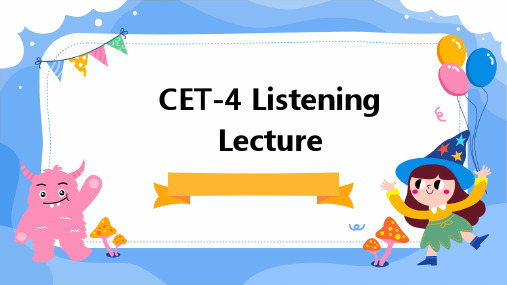
Before listening to the passage, quickly review the choices to get a sense of what the options are and what the question is asking.
CET-4 Lisew of Listening Examination • Listening skills explanation • Analysis of listening material types • Listening exam strategies and suggestions
Use context clues
Use contextual clues provided by the listening passage to help you fill in the blanks correctly.
03
Analysis of listening material types
04
Listening exam strategies and
suggestions
basic strategies
Understand the question types
Before the exam, make sure you understand the types of questions you will encounter in the listening section. This will help you to approach each question with the right strategy.
News reporting
2023年12月英语四级听力考试真题
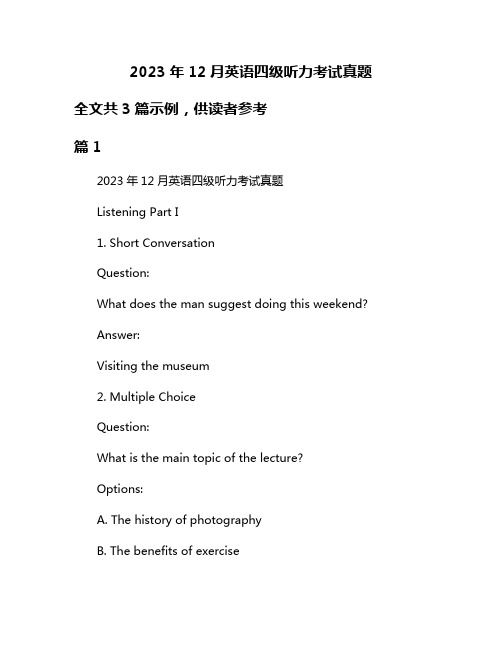
2023年12月英语四级听力考试真题全文共3篇示例,供读者参考篇12023年12月英语四级听力考试真题Listening Part I1. Short ConversationQuestion:What does the man suggest doing this weekend?Answer:Visiting the museum2. Multiple ChoiceQuestion:What is the main topic of the lecture?Options:A. The history of photographyB. The benefits of exerciseC. The invention of the telephoneAnswer:B. The benefits of exercise3. Long ConversationQuestion:What is the main purpose of the woman's presentation? Answer:To introduce a new marketing strategy4. Short TalkQuestion:What does the speaker say about the upcoming holiday trip? Answer:It will be an exciting adventureListening Part II5. Multiple ChoiceQuestion:What does the speaker say about climate change in recent years?Options:A. It has worsenedB. It remains unchangedC. It has improvedAnswer:A. It has worsened6. MatchingQuestion:Match the following terms with their definitionsOptions:1. Sustainability2. Renewable energy3. Carbon footprintDefinitions:A. The amount of carbon dioxide released into the atmosphere due to human activitiesB. Energy that comes from natural sources that are constantly replenishedC. The ability to maintain or support something over a long timeAnswers:1-C, 2-B, 3-A7. Multiple ChoiceQuestion:What is the speaker's opinion on genetically modified foods?Options:A. They are safe for consumptionB. They are harmful to human healthC. They have not been properly testedAnswer:A. They are safe for consumptionListening Part III8. Short ConversationQuestion:What does the man think about taking up a new hobby?Answer:He believes it will be a good way to relax9. Multiple ChoiceQuestion:What does the woman say about the upcoming business trip?Options:A. She is looking forward to itB. She is feeling stressed about itC. She is not prepared for itAnswer:A. She is looking forward to it10. Long ConversationQuestion:What is the main challenge the speakers face in their group project?Answer:Finding reliable sources for their research11. Short TalkQuestion:What is the main purpose of the speaker's talk?Answer:To raise awareness about environmental conservationPreparation Tips:- Practice listening to a variety of English accents to be prepared for different speakers.- Focus on understanding the main ideas and key points of the conversations and talks.- Take notes while listening to help remember important details.- Try to stay calm and relaxed during the exam to improve concentration.Remember to practice regularly and stay confident in your listening skills! Good luck on your exam!篇22023年12月英语四级听力考试真题Section AQuestions 1-3You will hear a conversation between a student and a professor. Listen to the conversation and answer the questions.1. What is the man's main problem?2. What does the professor suggest the man should do?3. What time does the library close tonight?Now, listen to the conversation.Questions 4-6You will hear a woman talking to a friend about a travel experience. Listen to the conversation and answer the questions.4. How did the woman feel about her trip to Italy?5. What does the woman say about the food in Italy?6. What was the woman's favorite part of the trip?Now, listen to the conversation.Questions 7-10You will hear a discussion about a new film. Listen to the discussion and answer the questions.7. What is the film mainly about?8. How did the speakers find the acting in the film?9. Where is the film set?10. What is the speakers' overall opinion of the film?Now, listen to the discussion.Section BQuestions 11-13You will hear a news report about a company. Listen to the report and answer the questions.11. What is the company's name?12. What is the main focus of the company?13. How many people does the company employ?Now, listen to the news report.Questions 14-16You will hear a radio program about a new museum. Listen to the program and answer the questions.14. What is the name of the new museum?15. What can visitors see at the museum?16. Why does the museum appeal to both adults and children?Now, listen to the radio program.Questions 17-20You will hear a talk about environmental issues. Listen to the talk and answer the questions.17. What is the main cause of deforestation?18. Why is pollution a problem in many cities?19. How can individuals help to protect the environment?20. What is the speaker's main message about environmental sustainability?Now, listen to the talk.That concludes the listening section of the exam. Please turn to the next page to begin the reading section.篇32023年12月英语四级听力考试真题Part A: DialogueQuestions 1-51. What are the speakers talking about?A) The man's holiday plansB) The woman's trip to ParisC) The man's upcoming presentationD) The woman's family reunion2. What does the man offer to do?A) Print out the woman's reportB) Pick up the woman's sisterC) Help the woman prepare for her presentationD) Book a hotel for the woman3. Why is the woman stressed?A) She has to give a presentationB) She has too much work to doC) She is moving to a new cityD) She is planning a vacation4. What does the woman ask the man to do?A) Call her sisterB) Drive her to the airportC) Print out her reportD) Book a hotel room5. What does the man suggest the woman do to relax?A) Go shoppingB) Take a yoga classC) Listen to musicD) Get a massagePart B: MonologueQuestions 6-106. What is the main topic of the monologue?A) The history of photographyB) Tips for taking better photosC) Famous photographers from the pastD) The development of modern cameras7. Where is the speaker giving the talk?A) At a photography exhibitionB) In a photography studioC) In a photography classD) At a camera store8. What does the speaker recommend for taking great photos?A) Using natural lightingB) Buying an expensive cameraC) Editing the photos heavilyD) Taking photos from a distance9. What does the speaker say about portraits?A) They should be taken with flashB) They should capture the subject's personalityC) They are not as important as landscape photosD) They should be taken in black and white10. What does the speaker suggest doing before taking photos?A) Planning out the shotsB) Using a tripodC) Editing the photos in advanceD) Taking a photography coursePart C: ConversationQuestions 11-1511. What is the woman's problem?A) She missed her flightB) She lost her luggageC) Her hotel reservation is incorrectD) She needs to change her return ticket12. What does the man offer to do?A) Lend the woman some moneyB) Drive the woman to the hotelC) Call the airline for the womanD) Carry the woman's bags13. What does the woman ask the man to do later?A) Take her sightseeingB) Show her around townC) Have dinner with herD) Help her find a nearby pharmacy14. What advice does the man give to the woman?A) To always double-check her flight detailsB) To avoid flying on busy holidaysC) To book her hotel earlyD) To pack light when traveling15. Where does this conversation most likely take place?A) At the airportB) At a hotel reception deskC) On a tour busD) In a taxiPart D: Short TalksQuestions 16-2016. What is the main topic of the talk?A) Camping in national parksB) The benefits of outdoor activitiesC) The importance of protecting the environmentD) Tips for hiking safely17. What does the speaker say about camping?A) It is always safeB) It can help you relaxC) It is expensiveD) It is difficult to do18. What is the speaker's advice for hiking in the mountains?A) To bring heavy equipmentB) To wear the right clothing and footwearC) To hike aloneD) To camp overnight19. What does the speaker recommend for a fun outdoor activity?A) SurfingB) SkiingC) Ice skatingD) Mountain climbing20. What is the speaker's final tip for outdoor activities?A) To always have a guide with youB) To leave no trace behindC) To take plenty of photosD) To pack a lot of food and waterThis concludes the listening portion of the exam. Remember to review your answers before moving on to the next section. Good luck!。
【2024版】大学英语四级听力考试套题练习及原文解析
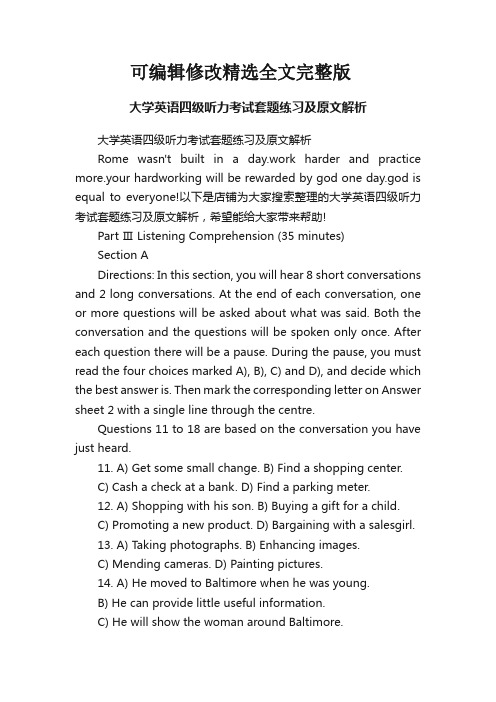
可编辑修改精选全文完整版大学英语四级听力考试套题练习及原文解析大学英语四级听力考试套题练习及原文解析Rome wasn't built in a day.work harder and practice more.your hardworking will be rewarded by god one day.god is equal to everyone!以下是店铺为大家搜索整理的大学英语四级听力考试套题练习及原文解析,希望能给大家带来帮助!Part Ⅲ Listening Comprehension (35 minutes)Section ADirections: In this section, you will hear 8 short conversations and 2 long conversations. At the end of each conversation, one or more questions will be asked about what was said. Both the conversation and the questions will be spoken only once. After each question there will be a pause. During the pause, you must read the four choices marked A), B), C) and D), and decide which the best answer is. Then mark the corresponding letter on Answer sheet 2 with a single line through the centre.Questions 11 to 18 are based on the conversation you have just heard.11. A) Get some small change. B) Find a shopping center.C) Cash a check at a bank. D) Find a parking meter.12. A) Shopping with his son. B) Buying a gift for a child.C) Promoting a new product. D) Bargaining with a salesgirl.13. A) Taking photographs. B) Enhancing images.C) Mending cameras. D) Painting pictures.14. A) He moved to Baltimore when he was young.B) He can provide little useful information.C) He will show the woman around Baltimore.D) He will ask someone else to help the woman.15. A) He is rather disappointed. B) He is highly ambitious.C) He can’t face up to the situation D) He knows his own limitation.16. A) She must have paid a lot B) She is known to havea terrific figure.C) Her gym exercise has yielded good results.D) Her effort to keep fit is really praiseworthy.17. A) Female students are unfit for studying physics.B) He can serve as the woman’s tutor.C) Physics is an important course at school.D) The professor’s suggestion is constructive.18. A) Indifferent. B) Doubtful. C) Pleased. D) Surprised.Questions 19 to 22 are based on the conversation you have just heard.19. A) He prefers the smaller evening classes. B) He has signed up for a day course.C) He has to work during the day. D) He finds the evening course cheaper.20. A) Learn a computer language. B) Learn data processing.C) Buy some computer software. D) Buy a few coursebooks.21. A) Thursday evening, from 7:00 to 9:45. B) From September 1 to New Year’s eve.C) Every Monday, lasting for 12 weeks. D) Three hours a week,45 hours in total.22. A) What to bring for registration. B) Where to attend the class.C) How he can get to Frost Hall. D) Whether he can use a check.Questions 23 to 25 are based on the conversation you havejust heard.23. A) A training coach. B) A trading adviser.C) A professional manager. D) A financial trader.24. A) He can save on living expenses. B) He considers cooking creative.C) He can enjoy healthier food. D) He thinks take-away is tasteless.25. A) It is something inevitable.B) It is frustrating sometimes.C) It takes patience to manage. D) It can be a good thing.Section BDirections: In this section, you will hear 3 short passages. At the end of each passage, you will hear some questions. Both the passage and the questions will be spoken only once. After you hear a question, you must choose the best answer from the four choices marked A), B), C) and D). Then mark the corresponding letter on Answer Sheet 2 with a single line through the centre.Passage OneQuestions 26 to 28 are based on the passage you have just heard.26. A) There were no planets without moons. B) There was no air or water on Jupiter.C) Life was not possible in outer space. D) The mystery of life could not be resolved.27. A) It has a number of active volcanoes. B) It has an atmosphere like the earth’s.C) It has a large ocean under its surface. D) It has deep caves several miles long.28. A) Light is not an essential element to it. B) Life can form in very hot temperatures.C) Every form of life undergoes evolution. D) Oxygen is not needed for some life forms.Passage TwoQuestions 29 to 31 are based on the passage you have just heard.29. A) Whether they should take the child home.B) What Dr. Mayer’s instructions exactly were.C) Who should take care of the child at home.D) When the child would completely recover.30. A) She encourages them to ask questions when in doubt.B) She makes them write down all her instructions.C) She has them act out what they are to do at home.D) She asks them to repeat what they are supposed to do.31. A) It lacks the stability of the printed word. B) It contains many grammatical errors.C) It is heavily dependent on the context. D) It facilitates interpePassage ThreeQuestions 33 to 35 are based on the passage you have just heard.32. A) Job security. B) Good labour relations.C) Challenging work. D) Attractive wages and benefits.33. A) Many tedious jobs continue to be done manually.B) More and more unskilled workers will lose jobs.C) Computers will change the nature of many jobs.D) Boring jobs will gradually be made enjoyable.34. A) Offer them chances of promotion.B) Improve their working conditions.C) Encourage them to compete with each other.D) Give them responsibilities as part of a team.35. A) They will not bring real benefits to the staff.B) They concern a small number of people only.C) They are arbitrarily set by the administrators.D) They are beyond the control of ordinary workers.Section CDirections: In this section, you will hear a passage three times. When the passage is read for the first time, you should listen carefully for its general idea. When the passage is read for the second time, you are required to fill in the blanks numbered from 36 to 43 with the exact words you have just heard. For blanks numbered from 44 to 46 you are required to fill in the missing information. For these blanks, you can either use the exact words you have just heard or write down the main points in your own words. Finally, when the passage is read for the third time, you should check what you have written.注意:此部分试题在答题卡2上。
大学英语四级考试(CET-4)听力讲义
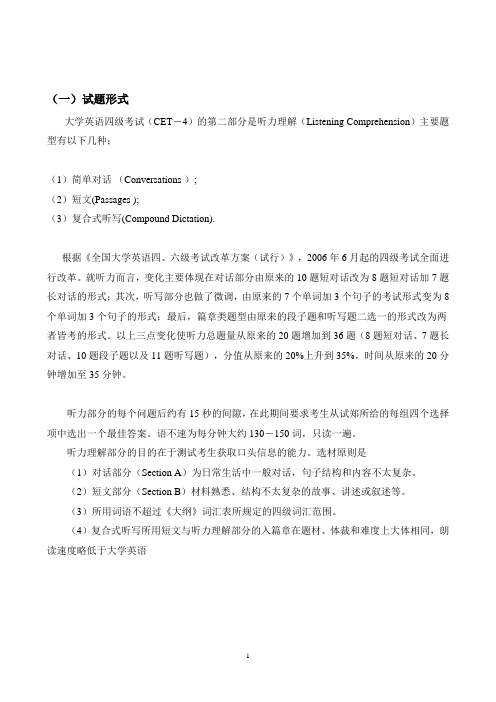
(一)试题形式大学英语四级考试(CET-4)的第二部分是听力理解(Listening Comprehension)主要题型有以下几种;(1)简单对话(Conversations );(2)短文(Passages );(3)复合式听写(Compound Dictation).根据《全国大学英语四、六级考试改革方案(试行)》,2006年6月起的四级考试全面进行改革。
就听力而言,变化主要体现在对话部分由原来的10题短对话改为8题短对话加7题长对话的形式;其次,听写部分也做了微调,由原来的7个单词加3个句子的考试形式变为8个单词加3个句子的形式;最后,篇章类题型由原来的段子题和听写题二选一的形式改为两者皆考的形式。
以上三点变化使听力总题量从原来的20题增加到36题(8题短对话、7题长对话、10题段子题以及11题听写题),分值从原来的20%上升到35%,时间从原来的20分钟增加至35分钟。
听力部分的每个问题后约有15秒的间隙,在此期间要求考生从试郑所给的每组四个选择项中选出一个最佳答案。
语不速为每分钟大约130-150词,只读一遍。
听力理解部分的目的在于测试考生获取口头信息的能力。
选材原则是(1)对话部分(Section A)为日常生活中一般对话,句子结构和内容不太复杂。
(2)短文部分(Section B)材料熟悉、结构不太复杂的故事、讲述或叙述等。
(3)所用词语不超过《大纲》词汇表所规定的四级词汇范围。
(4)复合式听写所用短文与听力理解部分的入篇章在题材、体裁和难度上大体相同,朗读速度略低于大学英语(二)命题原则:就考试发展形势而言,近年来体裁以说明文为主导,综合了各类文章考试特点而形成的综合式段子成为了我们的考试主流。
考查点依然集中在文章开篇前三句、结尾后三句以及文章中间的典型论据、原因转折、反复重复之处。
通过对历年的真题的研究,我们可以看出四级听力试题的命题点具有非常明显的规律,即只考察对小对话和文章中的关键信息进行考察,遵从下列原则:强调原则:对于讲话的人或者作者刻意强调的信息,命题的可能性很大。
四级英语考试真题202312月听力
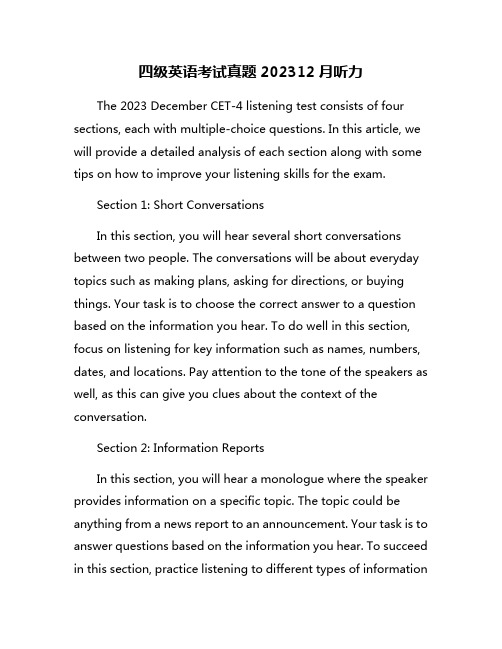
四级英语考试真题202312月听力The 2023 December CET-4 listening test consists of four sections, each with multiple-choice questions. In this article, we will provide a detailed analysis of each section along with some tips on how to improve your listening skills for the exam.Section 1: Short ConversationsIn this section, you will hear several short conversations between two people. The conversations will be about everyday topics such as making plans, asking for directions, or buying things. Your task is to choose the correct answer to a question based on the information you hear. To do well in this section, focus on listening for key information such as names, numbers, dates, and locations. Pay attention to the tone of the speakers as well, as this can give you clues about the context of the conversation.Section 2: Information ReportsIn this section, you will hear a monologue where the speaker provides information on a specific topic. The topic could be anything from a news report to an announcement. Your task is to answer questions based on the information you hear. To succeed in this section, practice listening to different types of informationreports in English, such as podcasts or news broadcasts. This will help you become familiar with the language and tone used in these types of situations.Section 3: Short TalksIn this section, you will hear a short lecture or talk on an academic topic. The speaker will provide detailed information and examples to support their main points. Your task is to answer questions based on the main ideas and supporting details in the talk. To excel in this section, practice listening for key points, examples, and transitions in spoken English. Try to take notes while you listen to help you remember important information.Section 4: Long ConversationsIn this final section, you will hear a longer conversation between two or more speakers. The speakers will discuss a more complex topic and express their opinions and ideas. Your task is to answer questions based on the main ideas, details, and opinions expressed in the conversation. To do well in this section, practice listening to natural conversations in English, such as interviews or group discussions. Pay attention to the flow of the conversation, the speakers' opinions, and any disagreements or agreements that arise.Overall, the key to success in the CET-4 listening test is practice. The more you listen to English spoken in different contexts, the better you will become at understanding and interpreting the language. Try to listen to a variety of sources, such as podcasts, TV shows, and lectures, to improve your listening skills. Good luck with your exam preparation!。
大学英语四级听力技巧(基本技巧)
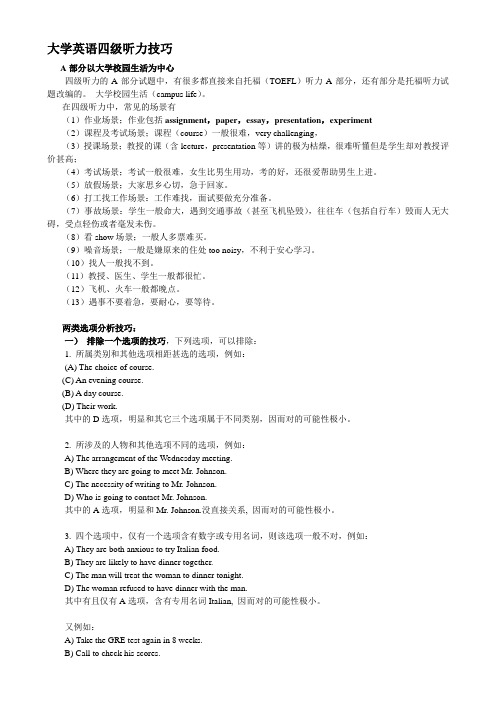
大学英语四级听力技巧A部分以大学校园生活为中心四级听力的A部分试题中,有很多都直接来自托福(TOEFL)听力A部分,还有部分是托福听力试题改编的。
大学校园生活(campus life)。
在四级听力中,常见的场景有(1)作业场景;作业包括assignment,paper,essay,presentation,experiment(2)课程及考试场景;课程(course)一般很难,very challenging,(3)授课场景;教授的课(含lecture,presentation等)讲的极为枯燥,很难听懂但是学生却对教授评价甚高;(4)考试场景;考试一般很难,女生比男生用功,考的好,还很爱帮助男生上进。
(5)放假场景;大家思乡心切,急于回家。
(6)打工找工作场景:工作难找,面试要做充分准备。
(7)事故场景:学生一般命大,遇到交通事故(甚至飞机坠毁),往往车(包括自行车)毁而人无大碍,受点轻伤或者毫发未伤。
(8)看show场景;一般人多票难买。
(9)噪音场景;一般是嫌原来的住处too noisy,不利于安心学习。
(10)找人一般找不到。
(11)教授、医生、学生一般都很忙。
(12)飞机、火车一般都晚点。
(13)遇事不要着急,要耐心,要等待。
两类选项分析技巧:一)排除一个选项的技巧,下列选项,可以排除:1. 所属类别和其他选项相距甚选的选项,例如:(A) The choice of course.(C) An evening course.(B) A day course.(D) Their work.其中的D选项,明显和其它三个选项属于不同类别,因而对的可能性极小。
2. 所涉及的人物和其他选项不同的选项,例如:A) The arrangement of the Wednesday meeting.B) Where they are going to meet Mr. Johnson.C) The necessity of writing to Mr. Johnson.D) Who is going to contact Mr. Johnson.其中的A选项,明显和Mr. Johnson.没直接关系, 因而对的可能性极小。
全新版大学英语4听说教程听力原文
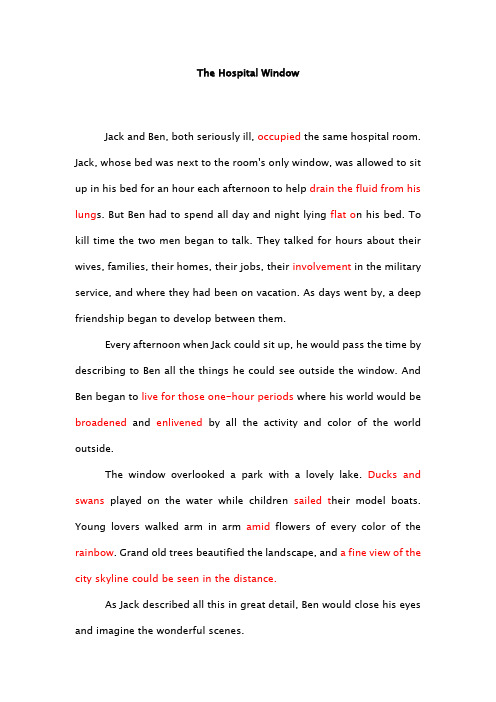
The Hospital WindowJack and Ben, both seriously ill, occupied the same hospital room. Jack, whose bed was next to the room's only window, was allowed to sit up in his bed for an hour each afternoon to help drain the fluid from his lung s. But Ben had to spend all day and night lying flat o n his bed. To kill time the two men began to talk. They talked for hours about their wives, families, their homes, their jobs, their involvement in the military service, and where they had been on vacation. As days went by, a deep friendship began to develop between them.Every afternoon when Jack could sit up, he would pass the time by describing to Ben all the things he could see outside the window. And Ben began to live for those one-hour periods where his world would be broadened and enlivened by all the activity and color of the world outside.The window overlooked a park with a lovely lake.Ducks and swans played on the water while children sailed t heir model boats. Young lovers walked arm in arm amid flowers of every color of the rainbow. Grand old trees beautified the landscape, and a fine view of the city skyline could be seen in the distance.As Jack described all this in great detail, Ben would close his eyes and imagine the wonderful scenes.One warm afternoon Jack described a parade passing by. Although Ben couldn't hear the band — he could see it in his mind's eye as Jack described it with colorful words.Days and weeks passed. One morning the day nurse arrived to bring water for their baths only to find the lifeless body of Jack, who had died peacefully in his sleep. She was very sad and called the hospital attendant s to take the body away.Ben was heartbroken. Life without Jack was even more unbearable. How he longed to hear Jack's voice and his fine descriptions of the outside world! As he looked at the window, an idea suddenly occurred to him. Perhaps he could see for himself what it was like outside. As soon as it seemed appropriate, Ben asked if he could be moved next to the window. The nurse was happy to make the switch, and after making sure he was comfortable, she left him alone.Slowly, painfully, he propped (支撑) himself up on one elbow to take his first look at the world outside. Finally, he would have the joy of seeing it for himself! He strained(尽全力)to slowly turn to look out the window beside the bed. It faced a blank wall!"What could have compelled my roommate to describe such wonderful things outside this window?" Ben asked the nurse when she returned."Perhaps he just wanted to encourage you to live on," she said."You know, he was blind and could not even see the wall".How Our Memory WorksHuman beings have amazing memories. Apart from all our personal memories about our own lives, we can recall between 20,000 and 100,000 words in our own language as well as possibly thousands more in a foreign language. We have all sorts of information about different subjects such as history, science, and geography, and we have complex skills such as driving a car or playing a musical instrument. All these things and countless others depend on our memory.How well you remember things depends on many different factors. Firstly, some people naturally have better memories than others, in just the same way as some people are taller than others, or have different color eyes. Some top chess players, for example, can remember every move of every game that they have ever seen or played.Secondly, research shows that different things are stored in different parts of the brain. Ideas, words, and numbers are stored in the left-hand side, while the right-hand side remembers images, sounds, and smells. In most people one side of the brain is more developed than the other, and this may explain why some people can rememberpeople's faces easily, but can't remember their names.Thirdly, we all remember exciting, frightening, or dramatic events more easily. This is because these experiences produce chemicals such as adrenaline, which boost (改善)your memory.Fourthly, the context(环境)in which you learn something can affect how well you remember it. Tests on divers, for example, showed that when they learned things underwater, they could also remember those things best when they were underwater.Lastly, the more often you recall a memory the more likely you are to remember it. If you don't use it, you'll lose it. A telephone number that you dial frequently will stay in your memory easily, but you will probably have to write down one that you use only now and again.Last Gasp for SmokersIt was a normal day and in their New York office, Ken and his colleagues stopped for their coffee break. But while his colleagues were able to sit at their desks and drink their coffee, Ken had to go outside. He couldn't stay inside, because he wanted to smoke. If the smokers of the Big Apple want to enjoy a cigarette,the authorities have decided they must go out into the street or up onto the rooftops.Throughout the United States, the number of places where people are allowed to smoke has gradually dwindled(缩小,减少). First it was banned on trains, buses, and planes, then in public places such as theaters and airports. Now you can't smoke in any workplace. Nonsmokers are definitely winning the battle. "Why should we breathe their smoke?" they say.If they're lucky, smokers can still find some bars and restaurants or parks and recreation(娱乐,消遣)centers where they can light up a cigarette, but it may soon be banned there, too. In fact, smoking in parks and recreation centers is already banned in California. On August 9, 2001, Los Angeles City and County officials announced the implementation(实施,执行)of a smoke-free park policy, officially designating (指定)smoke-free zones in all 375 parks and recreation centers in the city. And since January 1, 2002 all parks in California have become smoke-free to safeguard children from the harmful effects of secondhand tobacco smoke and dangerous tobacco waste. Anti-smoking groups even think that smoking ought to be banned in people's homes. Under new plans you won't be able to smoke in any house where there are more than ten visitors in a week, or where there are children.In 1996, nicotine was classed as a dru g, like cannabis, cocaine or heroin. And scientists all over the world agree that exposure(暴露)tosecondhand smoke poses(造成,提出问题)a s erious health risk and there is no safe level of exposure. It is especially dangerous for children because when they are exposed to tobacco smoke, they have much higher rates of lung diseases such as bronchitis and pneumonia and are also at greater risks of developing asthma.In the country that gave tobacco to the world, smoking might one day be illegal. And then Ken will have to give up.Chairman:Welcome to this special birthday edition of One World. Tonight we have a special program dedicated to birthday celebrations around the world. With us in the studio we have Shaheen Hag and Pat Cane, who have a weekly column on birthdays in the Toronto Daily Star. Shaheen: Good evening.Pat: Good evening.Chairman:Shaheen, perhaps we could begin with you. How are birthdays celebrated in India?Shaheen: Well, perhaps we're all assuming that everyone in the world celebrates their birthdays. This just isn't the case. Low-income families in India, for instance, simply can't afford any festivities. And most Muslims don't celebrate their birthdays.Pat: I think Shaheen has raised an interesting point here. The Christianchurch, too, was actively against celebrating birthdays.Shaheen: Of course some Muslims do celebrate their birthdays. In Egypt, Turkey and Indonesia, for example, the rich people invite friends and families around. But not in small villages.Chairman: Here in England your twenty-first used to be the big one. But now it seems to have moved to eighteen. Is that true?Pat: Yes, in most parts of the West eighteen is now the most important birthday. In Finland, for example, eighteen is the age when you can vote, you know, or buy wines, drive a car and so on. But in Japan I think you have to wait till you're twenty before you can smoke or drink. Shaheen: I know in Senegal, which is another Muslim country, girls get to vote at sixteen and boys at eighteen. And in Bangladesh, girls at eighteen and boys at twenty-one.Chairman: That's interesting. I mean is it typical that around the world girls are considered to be more mature than boys?Shaheen: Yes, I think so, and in Mexico and Argentina, for example, they have enormous parties for 15-year-old girls.Pat: You know in Norway they have a great party for anyone who's not married by the time they're thirty. It's kind of embarrassing. I mean you get pepper thrown at you.Chairman: Pepper? Why pepper?Pat: I'm not really sure.Shaheen: So does that mean that on your 29th birthday you can start thinking "God I better get married"?Pat: Well, I'm not sure how seriously they take it.Chairman: In England we have quite big parties for your fortieth, fiftieth, sixtieth and so on.Pat: Well, in Japan your eighty-eighth is considered ...Chairman: Eighty-eighth?Pat: to be the luckiest birthday. Eight is a very lucky number in Japan.Embarrassing ExperiencesInterviewer: Rob, you went to Brazil, didn't you?Rob: Yes, I did.Interviewer: So, what happened?Rob: Well, I went into this meeting and there were about, er ... seven or eight people in there and I just said "Hello" to everybody and sat down. Apparently, what I should have done is to go round the room shaking hands with everyone individually. Well, you know, it's silly of me because I found out later it upset everyone. I think they felt I was taking them for granted.Kate: Well, I know that because when I was in France the first time, Ifinished a meeting with "Goodbye, everyone!" to all the people in the room. Well, I later found out that the polite thing to do is shake hands with everyone in the group before leaving.Interviewer: Well, people shake hands in different ways, don't they? Rob: Oh, yes, they do. See, normally I shake hands quite gently when I meet someone. So when I went to the US for the first time, I think people there thought my weak handshake was a sign of weakness. Apparently, people there tend to shake hands quite firmly.Kate: Oh, gosh, that reminds me of my first trip to Germany many years ago, I was introduced to the boss in the company when he passed us in the corridor. Well, I wasn't prepared, and I had my left hand in my pocket. And when we shook hands I realized my left hand was still in my pocket. Well, that was, you know, very bad manners and I was quite embarrassed.Interviewer:And how about using first names? Have you made any mistakes there?Rob: Oh, yes, I have! When I first went to Italy I thought it was OK to use everyone's first name so as to seem friendly. And I later discovered that in business you shouldn't use someone's first name unless you are invited to. Oh, and you should always use thei r title as well.Kate:Hm, yeah, well, when I met people in Russia, you know, they seemed to be puzzled when I shook hands with them and said "How doyou do?" Well, what they do when they greet a stranger is to say their own names, so I had that all wrong!Rob: Oh, yes, I agree with that. Remembering names is very important. Interviewer: Shall we take a break? When we come back we'll move on to our next topic.Kate & Rob: OK.College Hunks (健美的男子)of JunkIt's the universal cry of parents, generally heard by the second day of college summer breaks: "Get a job!" Omar Soliman's mother joined the chorus. "You have to do something," she told him.Soliman's friends had obtained prestigious(享有声望的)internships(实习职位)in his hometown of Washington, D.C. But he couldn't imagine himself sitting at a desk all day. After years of delivering furniture for his mother's store, he remembered that a lot of people had stuff they wanted to get rid of. If he borrowed his mom's van (厢式货车), he could make a little money hauling their trash (垃圾)away for them.That night, Soliman came up with a name for his new business: College Hunks Hauling Junk. He distributed flyers(小广告传单)the nextday, and within hours, his phone was ringing. He asked his friend Nick Friedman to help out. They made $220 in three hours cleaning out a woman's garage.Soliman and Nick pocketed(将放入衣袋)$10,000 that summer. But the two weren't ready to become full-time trashmen after graduation. "We were trained to finish college and get a good job," says Soliman. He graduated with a business degree from the University of Miami and first went into marketing at a research firm. Friedman, who had an economics degree from Pomona College in California, became an economic analyst for a consulting compan y. Months later, they quit their jobs and started their junk business full time.At first they had trouble finding a bank willing to lend them money as they didn't have much of a credit rating. After five turndowns, one bank decided to gamble $50,000 on their idea. They put together another $60,000 from their parents and their own savings. They bought a truck, hired a graphic artist(平面造型设计师)t o design a logo, ran newspaper and radio ads and recruited(招聘)haulers on campuses. Wearing bright orange hats and green polos and khakis these college "hunks" will haul away everything from construction materials to old couches(床). To cut down the cost of unloading at landfills, they have learned to recycle metals and electronics and donate to charities over 60 percent of what they collect. They also give away a portion(部分)oftheir earnings from each job to local college scholarship programs.And now, just four years later, they run a nationwide company that pulled in(获得利益报酬)$3 million in 2008. They employ 130 people and have 16 franchises(加盟连锁店)in 10 states and D.C. and plan to expand to 80 franchises by 2012.The Embarrassment of RichesThe meaning of wealth today is usually defined as the amount of money and material goods that one has accumulated and the ability to purchase more goods at an ever-increasing rate. A wealthy person possesses so much money that it would be difficult for him to spend it all in his lifetime without being wasteful and extravagant.Speaking from a strictly practical point of view, the trouble with wealth is not that it arouses envy in the hearts of others but that it weighs very heavily upon the resources of its owner. Those who have never tasted luxury imagine that a new Porsche, a Picasso in the drawing room, an apartment in the Trump Tower, will bring them ease and happiness. If that were true, owners of the Porsches, Picassos, and Trumps of the world would all be happy souls. One glance at history tells you they are not.The problem is not simply that owning goods feeds upon itself, generating desires to possess more and to outdo(超过) other owners in a competitive madness. It's that goods themselves are an endless responsibility. They must be not only paid for but also stored, insured, and publicly admired. All of those cost not just money but personal freedom. As James Boswell, the famous British biographer, once wrote in his diary, "If a man with a fortune cannot make himself easier and freer than those who are not, he gains nothing. Nothing except glittering baggage that must be attended to."In some Oriental countries poverty has never been such a disgrace(耻辱)as it is in the "get-rich-quick" zone. Wise men from these lands often remark on the tyranny(暴政,专制)of goods. According to an old Persian proverb, "The larger a man's roof, the more snow it collects." And in his discussion of "Houses", a Lebanese poet and philosopher compares the lust(欲望)for comfort to a "stealthy((偷偷摸摸的)thing that enters the house a guest, and then becomes a host, and then a master."The same sentiment(意见,观点)is also expressed here in America by the great philosopher Ralph Emerson, who scorns(轻蔑)the acquisitiveness(对金钱的渴望和贪婪)of his day with the famous line "Things are in the saddle(马鞍), and ride mankind."Life Goes OnThe city of Ypres in Belgium has been invaded19 times, most famously in World War I. Some time ago I went with two friends to visit the battlefields and cemeteries(墓地)there, and particularly to see the tomb of my uncle who was killed in the war at the age of 20.Michael, our silver-haired(发白如银的)guide, took us first to a British cemetery, just outside the town. There are lines of gravestones (墓碑), neatly planted with herbs(香草)and flowers, and surrounded by low walls blooming(开花)with wisteria(紫藤). Michael pointed out my uncle's grave (墓穴)to me.I walked hesitantly toward it, wondering what I would feel. And suddenly there it was, and there were hundreds of others. Nothing could have prepared me for the realization that in this area alone about 250,000 British and Commonwealth soldiers were killed. There are 75 British cemeteries, but we visited just a few.Next, Michael took us to a place on the other side of the city. The names of 55,000 missing soldiers are engraved(雕刻)on its walls. We stared in awe(敬畏的). "More than half a million horses and mules(骡子)were lost, and fifteen tons of unexploded ammunition(军火)are still collected each year from the fields," Michael told us.Then we came to the largest British cemetery in the world. Someheadstones(墓碑)have words of love or gratitude: "He died that we might live," "Gone from our sight but not from our hearts.""I'd like you to visit a German cemetery before finishing," Michael said. The cemetery is in wooded(树木繁茂的)land. But there are no headstones, only slabs(平板)in the grass. There are no flowers, either. The whole place is dark and dank.(潮湿的)With some relief we returned to the car. After some time, we drew up(集合)at a gate. Here, hidden from the road, lies the Pool of Peace. "It was created by an explosion so loud it was heard in Downing Street," said Michael. We looked at the still water reflecting the trees surrounding it. There is hardly (几乎没)a sound.By the time we returned to Ypres, it was evening. The city was preparing for the annual Festival of the Cats, which dates from(追溯)medieval (中世纪的)times. Soon there would be dancing in the square.A Terrible DiseaseThe phone rang and it was my husband Jack asking me to take some lunch to his office. As I drove off, I noticed a new shopping center. Strange I hadn't noticed it before. Near his office I also saw a fire station (消防站)I didn't r ecognize."When did they build that new shopping center?" I asked Jack."And I'm glad to see that new fire station. It'll give a good landmark.""Diana, they've been there for ages," Jack scolded.Bewildered, I became angry and, starting up the engine, began to pull away(离开). Then I braked. Where was the exit? Suddenly, nothing was familiar. I realized I had no idea how to get home. I had to stop again and again to ask for directions. Eventually, I got home. A 30-minute drive had taken me four hours.Two months later, at the office where I worked as a legal researcher, a smart young man approached me."Hi, Diana. Good to see you," he said, smiling.I hesitated, then smiled with resignation(屈从,顺从)."Please forgive me, it's one of those days. I simply can't bring your name to mind.""Diana, I'm your cousin Richard," he said very slowly.After that, I was constantly making mistakes and kept forgetting my way around the building. In the end, I made the painful decision to resign from work.Desperate to discover what was wrong with me, I made an appointment with a neurologist.After various tests he told me I had Alzheimer's disease. I felt numb. I'd hoped to find I was worrying about nothing, but now my worst fears were confirmed. And I was only 53!When I told Jack and my three grown-up children about mydisease, their reaction was quiet but supportive. "Stop worrying," Jack said. "We'll take good care of you."Now at 57, on good days I'm filled with hope and determination, but on bad days I have the worst sense of being alone. I've started a support group for other sufferers,for I know it's essential to have contact with people who are walking through the same maze(迷宫). Jack's coping well. While he still dreams of waking up to find all this has been a horrible nightmare, he's assured me that I can depend on him. When we married he didn't know "for better or worse" included Alzheimer's. But neither did I.Home-Schooling on a World CruiseI've never believed that the only way to get an education is to sit at a desk with four walls around you. The world is our classroom and our home, a 41-foot sailing boat, takes us there. My husband and I dreamed of sailing around the world before our daughters were even born. Their arrivals only increased our desire to live the cruising lifestyle, a way of life that has given us the opportunity for lots of quality and quantity family time. Educating our two daughters while living afloat on our sailing boat has added a wonderful new dimension to our lives.We started out years ago with a kindergarten correspondence (一致)course f or our daughter Kate. As she found it very easy we devised our own curriculum for her.Choosing courses of study for Kate was great fun. We looked at where we would be sailing to during the school year, or where we would be stopping to work, and all sorts of topics of interest presented themselves. For example, while cruising(乘船巡游)down the East Coast to Florida, we chose space exploration for a unit of study. Our studies included both fictional and non-fictional reading, experiments and writing assignments. The finale(结尾)was watching a shuttle(航天飞机)launch and visiting the Kennedy Space Center museums.We do miss out on(错过好机会)a few things that most school children are able to take advantage of. Our sailing boat is small. School is held on a small dining table and it's difficult to leave artwork, science experiments or projects on the table for later use. We also have limited room for school books and so those we have must be chosen carefully. Perhaps the thing we miss the most is not always having access to a library.But the advantages of our floating school far outweigh(比。
修改稿英语四级听力讲座

缺课 缺课原因: get ill 由于生病而缺课 oversleep睡过头了 traffic jam交通堵塞/ (car) break down车抛锚
买东西 supermarket超级市场: price tag价格签,special offer/ on sale打折,cart手推车,cashier收银员 department store百货商店: appliance家用电器, costume服装, men’s 男装区, sport’s goods体育用品, for sale 热卖中,待售中, discount打折,70% off 三折,
单击此处添加小标题
Who is the man/ woman?(问人物身份)
单击此处添加小标题
Why did/ didn’t the man/ woman do sth.? (在理解大意的基础上问原因)选项中可能会出现because这样的字眼
单击此处添加小标题
短对话常见题型
But 题型 形式:A:…… B:……,but ……. 重点听第二个说话人B说话,but 后面所说的话为重点,出题点往往在but后面。四级听力题中,But 后面的为重点的占95%,之前的为重点的占5%。
修理东西
TV, refrigerator (fridge)冰箱, oven电烤炉
关于工作 常考思路: 找到工作高兴 失去工作伤心 a.被解雇 b.离开旧工作 拒绝工作令人感到奇怪
场景题提问方式: What (过去,现在,将来) Where is the conversation taking place? / Where does the conversation take place? When is the conversation taking place? Who/Where (location) 问人是谁,可以从他所在的地方来判断。
- 1、下载文档前请自行甄别文档内容的完整性,平台不提供额外的编辑、内容补充、找答案等附加服务。
- 2、"仅部分预览"的文档,不可在线预览部分如存在完整性等问题,可反馈申请退款(可完整预览的文档不适用该条件!)。
- 3、如文档侵犯您的权益,请联系客服反馈,我们会尽快为您处理(人工客服工作时间:9:00-18:30)。
Ⅰ. 1. 四级听力常考题型 (20016年6月开始)
Ⅱ. 听力策略与技巧
预测策略 词汇策略 记笔记策略 语法策略、推理策略 意义策略和建立听觉形象策略
1. 预测策略
在听之前,预览选择项来预测将听到的内容。 其中包括了:标题、选择项等信息对要听的话题进行有关的联想 。
原文中第二个人说到“she was popular even when she was a child”推知答案为D。even when…强调是经常性的状态
做题技巧: 1.一般来说,正确答案会是说话者原话的同义表述,例如,选项中的D就是she was popular even when she
was a child的同义表述。
短对话听力的一些原则
1. 推理原则:一般需对对话进行推理,故直接在对话中听到的一般不是正确答案。 2. 挫折原则:通常要办的事情都是不顺利的(如买东西买不到,订房间客满等)
3. 男女原则:一般男生比较衰,女生比较牛。男生提出的观点女生都是不同意或有不同看 法的,反之女生提出的观点男生都是同意和赞赏的。 男生的特征:脏、乱、差、浪费、穷、小气、不良习惯、迟钝、不顾家 女生的特征:爱干净、节约、富有、好学、能干、聪明、大度、耐心、恋家、除数理化外成 绩都很好 4. 父母一般只有一个作用教育子女好好学习
Ⅲ. 不同题型的应试技巧
在四级听力考试中,我们是事先不知道问题的,我们面对的是每一道题的四个选择项。如果要提高 听力的得分,提高我们的阅读题目的速度以及研究选择项所给予我们的提示成为关键。
1.短对话(Short Conversations)
短对话是听力考试的第一部分,也可以说是最容易拿分的部分,因为篇幅短小,听者更容易记住关 键信息。
(1)快速浏览选项,我们可以发现四个选项的关键词都是形容词。问题可能是“How does he think/ find about sth.?”
(2)从job,workload,office这些词可以推断内容跟某人的新工作有关。 (3)C选项内容与其他三项相差比较远,可以预先排除。
15题原文:
W: I heard about your promotion. You must be thrilled.
B) 举Sh真e 题en的jo短ys对en话te为rta例ining small children. C) She threw a surprise party for her friend. D) She has always enjoyed great popularity.
关键信息: (1) 从party, entertaining, friend等信息推断对话可能跟某次party有关。 (2)动词时态的差异提示我们要注意问题问的是所谈论对象过去的动作还是经常性的表现。
6. 意义策略
不需要听懂每一个词,注重听懂大意。如: 1.听英语时主要关注材料的大意,而并非每句话,每个词。 2.根据听懂的句子总结文章的大意。 3.在听音过程中,注意力放在词组意群上而不是独个单词上。
7. 建立听觉形象策略
1.在听英语过程中,在脑中描绘所听的内容,即使其情景化。 2.在听音过程中,把听到的内容用图像在大脑中反映出来。
做题技巧: 1. 对于内容与其他三项内容相差比较远的选项,我们可以预先排除,比如这一题的A选项。
2. 注意意思相反的选项,比如这题的B和D。B讲的是买一台新的洗衣机,D讲的是修好旧的洗衣机。意 思相反的选项很有可能其中一个是正确答案。
15. A) He is pleased with his exciting new job. B) He finds the huge workload unbearable. C) He finds his office much too big for him. D) He is not so excited about his new position.
考试 Final exam 期终考试 middle exam 期中考试 make up 补考 test 测验 pop test 事先没有说好的测验 quiz 测验 oral test 口试 考试临近
draw on / in sight of / draw nearly 考试延期或取消
delay / be off / defer / hold up / postpone / put off / suspend
选项
5. Where does the conversation most probably take place? (问地点) 出现过3次。注意与特殊地点相关的提示性信息
6. What are the speakers talking about?/ What contribute to sth.? 出现两次,答案中会出现概括性比较强的字眼 7. Who is the man/ woman?(问人物身份) 出现过1次,注意与人物身份相关的提示性信息 8. Why did/ didn’t the man/ woman do sth.? (在理解大意的基础上问原因) 出现1次,选项中可能会出现because这样的字眼
2. 词汇策略
听的过程难免会碰见生词。 1. 碰到生词时,跳过去继续往下听。 2. 在脑海里建立视觉形象来帮助理解生词和新信息。 3.利用上下文猜测生词和词组。
3. 记笔记策略
记录关键词或重要信息,并运用缩写、符号等培养自己的记笔记风格。如: 1.在听音过程中,记录一些细节(如时间,地点,人物,数字等)。 2.在听音过程中,有效地运用缩写、符号等速记形式。
4. 语法策略
利用语法知识更好地理解说话者的意思(如:虚拟语气,语篇标记词,对长句的结构分析等),如: 在听音过程中
1. 运用语言知识帮助理解 如固定搭配 2. 集中精力于理清句法关系,特别注意推导句法关系的关键词,如cause, but, conclude等。 3. 更多注意篇章结构特点。
A. She’s been to a restaurant. B. She’s been to a bakery. C. She’s been to a grocery store. D. She’s been to a bank.
M: What have you bought, Jane? W: I’ve bought a five-pound bag of potatoes and a loaf of bread. Q: Where has Jane been?
M: Not really. The new office is huge, but the workload has doubled.
做题技巧:
1.
第一个人说的话把话题提出来,第二个人的话是对主题的评价,要把握第二个人对于某事物或某
人的看法。
2.
第二个人回答时可能会出现省略,所以一定要记得第一个人所说的主题内容是什么。
3.
特别注意一些如however, but之类的转折词
以上举的一套真题实例说明,拿到题目,同学们要做的第一件事就是抓紧时间看选择项
建议同学们在试题卷上可以用笔把预览时发现的有助于我们做判断的关键词划下横线,要有选择性 地划而不是全划
那么还有同学想问,如果四个选项中我听到了好几个怎么办,那提醒大家要逆向思考,会不会考的 是没有提到的选项呢?
5. 除了父母教育子女外,家里(包括朋友家,阿姨家等等)发生的事情一般是不考的,故 遇到地点推测题类似 at home / at Mary’s home 之类的选项一般都是不对的。 6. 四级听力短对话只考日常生活学习中遇得到事情,问题,故如果选项中出现一些日常生 活中不太可能发生或很少发生的事情一般不会是正确选项
5. 推理策略
激活和话题或场景相关的背景知识及常识,通过说话者的语调、语气推断出对话的场景和人物关系 或说话者的态度、看法。如:
1.听英语材料时,借助背景声音,说话者的语气语调帮助理解。
2.在听音过程中,常借助语境(如背景声音、说话者的语气语调、说话者的态度等)来推测听力材 料中谈话发生的地点、说话者间的关系。
2. 一般情况下,第一个说话人讲的话会告诉我们谈话的主题或提出问题,第二个说话人的话是我们要 揣摩的重点,因为通常重要提示信息就隐藏在第二个说话人的话里面。
3. 多注意概括性较强的答案.
14. A) Make a profitable investment. B) Buy a new washing machine. C) Get parts for the machine from Japan. D) Have the old washing machine fixed.
短对话十大场景及一般思路
1. 借车:车一般是借不到的 2. 吃:匹萨,海鲜吃了一般会有不适反应,“派”一般比较好吃 3. 考试:作业、论文一般比较难,或须要熬夜 教授一般比较严厉 选修课较难较多 4. 坐车(飞机、轮船):一般都需要等 5. 事故(灾难):光明原则,一般不会死人
6. 听讲座:题目一般是比较有趣丰富的,内容一般是比较复杂难懂的 7. 论文:一般需要修改(polish)或重写(rewrite) 8. 休闲:男生一般喜欢待在家里看 TV 或者看moive,女生一般喜欢高雅艺术如theater 9. 医院:需要预约 make an appointment 10 买票:基本上是买不到的
选均以动词开头,我们可以推断所问的可能是 “What does sb. want to do?”或者 “What does sb. suggest sb. else do?”之类的问题。
从选项中重复出现的washing machine, 以及buy, fixed, old, new等信息判断对话可能关于洗衣机坏了, 到底是修还是买一个新的洗衣机的问题。
短对话部分的内容主要是日常生活中的一般性对话,即衣,食,住行,工作,学习等话题。所以大 家可以根据不同的场景记忆不同的单词。
